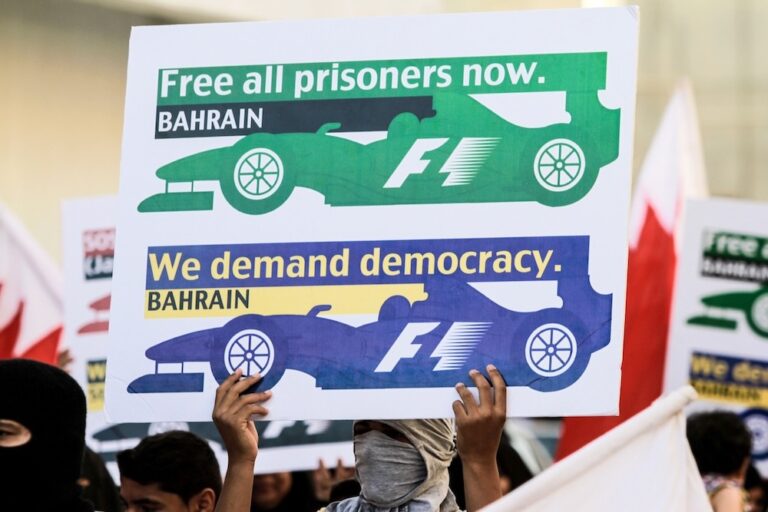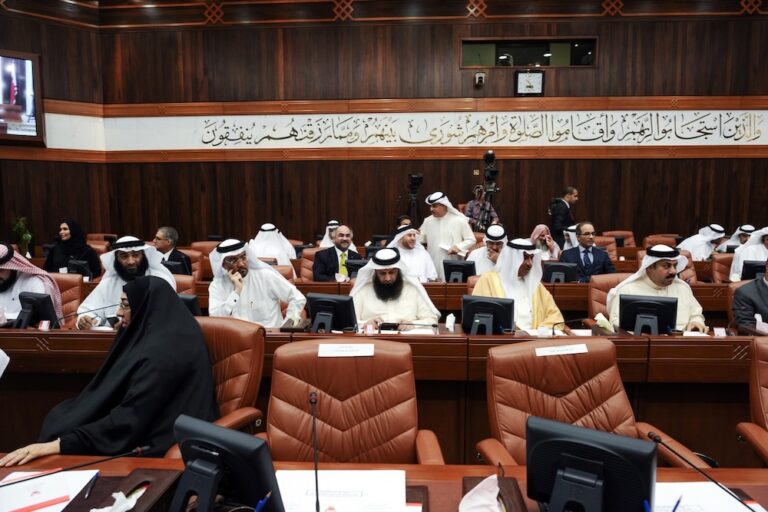The authorities deployed armed special forces to prevent well known public figures from expressing their views in a gathering to celebrate Independence Day.
(BCHR/IFEX) – The Bahraini authorities deployed armed special forces to prevent well known public figures from expressing their views in a public gathering to celebrate the 38th anniversary of Bahrain’s Independence Day, on 14 August 2009.
Three days earlier, the president of the Al-Attar Center was phoned by an official from the Interior Ministry advising him that the event was forbidden and utmost force would be used to prevent it. The administrator of Al-Attar was summoned to the Central Governorate at around noon (local time) on 13 August and was advised of the same prohibition, but he gave assurances that the event would not be held at the Al-Attar premises. The security officials did not let the Al-Attar president leave until he signed a statement taking responsibility if the celebration was held. At mid afternoon of the same day, the Al-Attar Center was surrounded and all entries leading to it were blocked by armed special forces personnel, to prevent anyone from coming closer.
Half an hour before the launch of the event, a press conference was held by the organisers and was broadcast via the internet to advise of the cancellation of the celebration at the Al-Attar Center. According to the organisers, they made their decision in order to prevent any form of confrontation between people who were eager to attend the event and the security forces.
In the press conference, the organisers expressed their astonishment at the ban prohibiting the public expression of views in a celebration which aims “to revive a national day.” Hasan Mushaima, the secretary general of the HAQ Movement, stated that “the celebration was to enshrine a national day in the sentiment of the people, and was not meant to cause any troubles.” In a communiqué released at the press conference, the organisers said, “It is well known that people liberated after a prolonged colonisation celebrate the day of (the colonisers’) departure from their territory, as they consider it a sign of victory and pride.”
The planned celebration was to be composed of speeches by some popular figures, short clips and poems recited by youth and children, as well as distribution of sweets and a pamphlet shedding light on the historic event in Bahrain during independence in the early 1970s. It should be mentioned that the authorities do not consider 14 August to be a national day, rather, they celebrate a national day on December 16th, when the late Amir was enthroned in 1971.
The president of BCHR, Nabeel Rajab, commented on the event: “It is a very strange action by the local authorities to deploy force to prevent people from expressing their views of what they consider a national day and celebrate in a civilised way.” He added, “The authorities are hysterical in dealing with any form of freedom of speech, especially when it occurs in public premises.”
BCHR considers the attitude of the Bahraini authorities to be alarming and expresses concern for the deterioration in the level of freedom of expression. BCHR calls for:
– the Bahraini authorities to show respect for the basic rights of freedom of expression and assembly, as secured by international covenants.
– the authorities to abide by their vows and commitments in the ratified ICCPR, particularly its articulation focusing on the right to freedom of expression.
– the Bahraini laws, which have been used as a legal means of repression of all forms of expression, to be nullified or modified to come in line with international human rights conventions.


